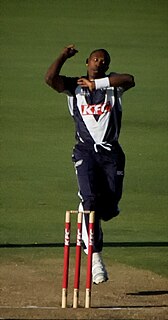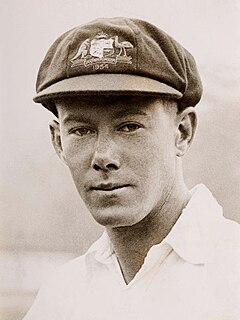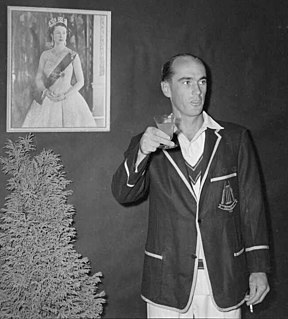Related Research Articles

Dwayne John Bravo is a Trinidadian cricketer, who played all formats of the game and a former captain of West Indies in all formats and plays league cricket for Chennai Super Kings & Quetta Gladiators. A genuine all-rounder, Bravo bats right-handed and bowls right-arm medium-fast pace. He is particularly known for his aggressive batting in the middle order, and for his "at the death" bowling. He is also known for his variety of lengths he can bowl at. He also performs as a singer.

William Alfred Brown, OAM was an Australian cricketer who played 22 Tests between 1934 and 1948, captaining his country in one Test. A right-handed opening batsman, his partnership with Jack Fingleton in the 1930s is regarded as one of the finest in Australian Test history. After the interruption of World War II, Brown was a member of the team dubbed "The Invincibles", who toured England in 1948 without defeat under the leadership of Don Bradman. In a match in November 1947, Brown was the unwitting victim of the first instance of "Mankading".

Ian David Craig, OAM was an Australian cricketer who represented the Australian national team in 11 Tests between 1953 and 1958. A right-handed batsman, Craig holds the records for being the youngest Australian to make a first-class double century, appear in a Test match, and captain his country in a Test match. Burdened by the public expectation of being the "next Bradman", Craig's career did not fulfil its early promise. In 1957, he was appointed Australian captain, leading a young team as part of a regeneration plan following the decline of the national team in the mid-1950s, but a loss of form and illness forced him out of the team after one season. Craig made a comeback, but work commitments forced him to retire from first-class cricket at only 26 years of age.

Herbert (Herbie) Leslie Collins was an Australian cricketer who played 19 Tests between 1921 and 1926. An all-rounder, he captained the Australian team in eleven Tests, winning five, losing two with another four finishing in draws. In a Test career delayed by First World War he scored 1,352 runs at an average of 45.06, including four centuries. Collins was also a successful rugby league footballer, winning the 1911 NSWRFL season's grand final with the Eastern Suburbs club.

George Henry Stevens "Harry" Trott was an Australian cricketer who played 24 Test matches as an all-rounder between 1888 and 1898. Although Trott was a versatile batsman, spin bowler and outstanding fielder, "... it is as a captain that he is best remembered, an understanding judge of human nature". After a period of some instability and ill discipline in Australian cricket, he was the first in a succession of assertive Australian captains that included Joe Darling, Monty Noble and Clem Hill, who restored the prestige of the Test team. Respected by teammates and opponents alike for his cricketing judgement, Trott was quick to pick up a weakness in opponents. A right-handed batsman, he was known for his sound defence and vigorous hitting. His slow leg-spin bowling was often able to deceive batsmen through subtle variations of pace and flight, but allowed opposition batsmen to score quickly.

William Harold PonsfordMBE was an Australian cricketer. Usually playing as an opening batsman, he formed a successful and long-lived partnership opening the batting for Victoria and Australia with Bill Woodfull, his friend and state and national captain. Ponsford is the only player to twice break the world record for the highest individual score in first-class cricket; Ponsford and Brian Lara are the only cricketers to twice score 400 runs in an innings. Ponsford holds the Australian record for a partnership in Test cricket, set in 1934 in combination with Don Bradman —the man who broke many of Ponsford's other individual records. In fact, he along with Bradman set the record for the highest partnership ever for any wicket in Test cricket history when playing on away soil
Ramesh Rajaram Powar

When the First World War ended in November 1918, thousands of Australian servicemen were in Europe as members of the First Australian Imperial Force (AIF) and many remained until the spring of 1919. In England, a new first-class cricket season was planned, the first since 1914, and an idea that came to fruition was the formation of an Australian touring side made up of servicemen. Agreement was reached with the Australian Corps HQ in London, commanded by Field Marshal William Birdwood, 1st Baron Birdwood, and the Australian Imperial Force Touring XI was formed, initially under the captaincy of pre-war Test player Charlie Kelleway. Kelleway departed after only six matches following a dispute about the fixtures list. A players' meeting elected future Test player Herbie Collins as team captain for the remainder of the tour, despite the fact that Collins' military rank was lance corporal and there were seven officers in the party. The bulk of the team remained intact for nearly nine months from May 1919, playing 33 matches in Great Britain, ten in South Africa on their way home and then another three in Australia itself before disbanding in February 1920. Of the 46 matches, 39 are adjudged first-class and the team had only four defeats, all of these in England. The players lived on their army pay and all profits from gate money went to an AIF Sports Control Board.
Sunil Philip Narine is a Trinidadian cricketer who plays internationally for the West Indies. He made his One Day International (ODI) debut in December 2011 and Test match debut in June 2012. Primarily an off-spin bowler, he is also an aggressive left-handed batsman.
Karl Robert Brown is an English cricketer. He is a right-handed batsman and a right-arm medium-pace bowler who played for Lancashire until 2018. Brown made his first-class debut in 2006 and his list A debut the following year. Between 2005 and 2007, Brown played 15 Youth One Day Internationals. In 2011, Brown scored his maiden centuries in first-class and list A cricket and debuted for Lancashire in twenty20s.

Kane Stuart Williamson is a New Zealand international cricketer who is currently the captain of the New Zealand national team in all formats. He is a right-handed batsman and an occasional off spin bowler. Williamson made his first-class cricket debut in December 2007. He made his U-19 debut against the touring Indian U-19 team the same year and was named captain of the New Zealand U-19 team for the 2008 U-19 Cricket World Cup. He made his international debut in 2010. Williamson has represented New Zealand at the 2011, 2015 and 2019 editions of the Cricket World Cup and 2012, 2014 and 2016 editions of the ICC World Twenty20. He made his full-time captaincy debut for New Zealand in the 2016 ICC World Twenty20 in India. He captained New Zealand national team in 2019 Cricket World Cup and led the team to the finals. He was then awarded the Player of the Tournament award.
Peter James Robinson is a former English cricketer who played first-class cricket for Worcestershire and Somerset during the 1960s and 1970s; he also played List A cricket for Somerset, who capped him in 1966. He is the nephew of England Test cricketer Roly Jenkins.
Duncan Phillip Bradshaw is an English cricketer. Bradshaw is a right-handed batsman who bowls right-arm fast-medium. He was born in the Zimbabwean capital of Harare into a White Zimbabwean family of British descent and educated at Hilton College in South Africa, before moving with his family to England.
Samuel Badree is a Trinidadian cricketer who plays internationally for the West Indies. He is a right-arm leg-spin bowler.
Chadd James Sayers is an Australian cricketer from South Australia. After spending several years in the South Australian Grade Cricket League as one of the best pace bowlers in the state, Sayers began playing first-class cricket for South Australia in the Sheffield Shield in 2011. He has played matches for Australia A since 2013 and made his debut playing Test cricket for Australia on 30 March 2018 against South Africa at Johannesburg after years of near misses.
David Carpenter is a former first-class cricketer who played for Gloucestershire from 1954 to 1963.

Oliver George Robinson, known as Ollie Robinson, is a professional cricketer who plays for Kent County Cricket Club. Robinson plays as a wicket-keeper or as a specialist batsman.
Peter Mark O'Reilly is a former Irish sports journalist for The Sunday Times, and a former first-class cricketer.
Simon Max Butler is a former English first-class cricketer.
Christopher George Prowting is a former English first-class cricketer.
References
- 1 2 "Teams Martin Robinson played for" . CricketArchive. Retrieved 20 December 2018.
- 1 2 "First-Class Matches played by Martin Robinson" . CricketArchive. Retrieved 20 December 2018.
- ↑ "First-class Batting and Fielding For Each Team by Martin Robinson" . CricketArchive. Retrieved 20 December 2018.